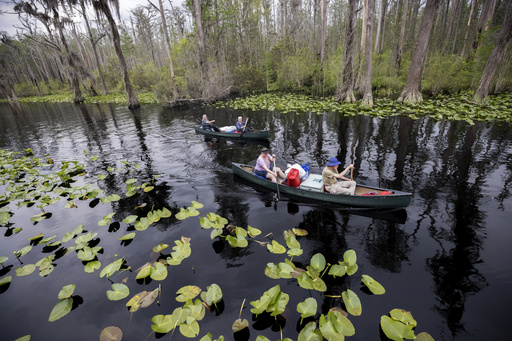
SAVANNAH, Ga. — On Friday, a federal agency suggested expanding the Okefenokee Swamp’s wildlife refuge, which could result in a buyout offer for land designated for a mining operation that has faced opposition from conservationists for several years.
The U.S. Fish and Wildlife Service announced its consideration of adding approximately 22,000 acres (8,900 hectares) adjacent to the Okefenokee National Wildlife Refuge, recognized as the largest federal refuge east of the Mississippi River.
This proposed expansion involves land currently owned by Twin Pines Minerals, which is nearing the acquisition of state permits to mine titanium dioxide near the southeastern edge of the swamp.
Experts have alerted officials that mining in close proximity to the Okefenokee’s unique bowl-like structure could significantly damage the swamp’s hydrology and exacerbate the occurrence of drought. In a statement made in 2022, Interior Secretary Deb Haaland emphasized that the mining project poses an “unacceptable risk” to this delicate ecosystem located at the Georgia-Florida border.
The Fish and Wildlife Service stated that it will be accepting public feedback on the expansion proposal for the next 30 days. In a news release, the agency said, “If adopted, the proposed minor boundary expansion would enable the Service to work with willing landowners to explore voluntary conservation actions, including potential acquisition, that would further protect the refuge’s globally significant freshwater wetland system and wildlife habitat.”
This proposal is timely, as Twin Pines awaits the final nod from Georgia’s environmental authorities regarding its mining project, which is less than 3 miles (4.8 kilometers) away from the current boundary of the refuge. The company, which submitted their initial permit applications in 2019, maintains that it can conduct operations close to the Okefenokee refuge without causing damage.
In February, the Georgia Environmental Protection Division released draft permits for the project, noting that their assessment indicated “water level in the swamp will be minimally impacted.” However, final permits are still under consideration.
Stretching nearly 630 square miles (1,630 square kilometers) in southeastern Georgia, the Okefenokee refuge is home to over 400 animal species, including alligators and bald eagles. The swamp attracts around 400,000 visitors each year, as reported by the Fish and Wildlife Service, which oversees the refuge.
Environmental activists who have been opposing the mining proposal welcomed the federal agency’s initiative to create a larger buffer zone surrounding the refuge.
Rena Ann Peck from the Georgia River Network stated, “Scientists say to protect what’s inside the swamp, you have to protect what’s on the outside.”
Josh Marks, an environmental attorney in Atlanta and an outspoken opponent of the mining endeavor, dubbed the proposed expansion of the refuge “a critical first step.” He asserted, “It’s the strongest representation to the state of Georgia that the federal government wants a permanent solution to this problem.”
Marks urged Georgia Governor Brian Kemp to halt the permit issuance and collaborate with the federal authorities to ensure the long-term protection of this precious natural resource.
A representative from Twin Pines has not yet provided a response to requests for comments regarding the proposed changes.
Under normal circumstances, the U.S. Army Corps of Engineers would be responsible for granting necessary permits. However, it lost authority over this particular Georgia project in 2020 due to regulatory rollbacks enacted during the Trump administration.
In January, the U.S. Fish and Wildlife Service attempted to regain some oversight, claiming legal rights to the waters that sustain the Okefenokee refuge.
Twin Pines has sought permission to extract over 1.4 million gallons (5.3 million liters) of water daily for its mining operation. The agency has stated that federal regulations prohibit the project from diverting water from the refuge in ways that could jeopardize its critical role as a habitat for native species.
